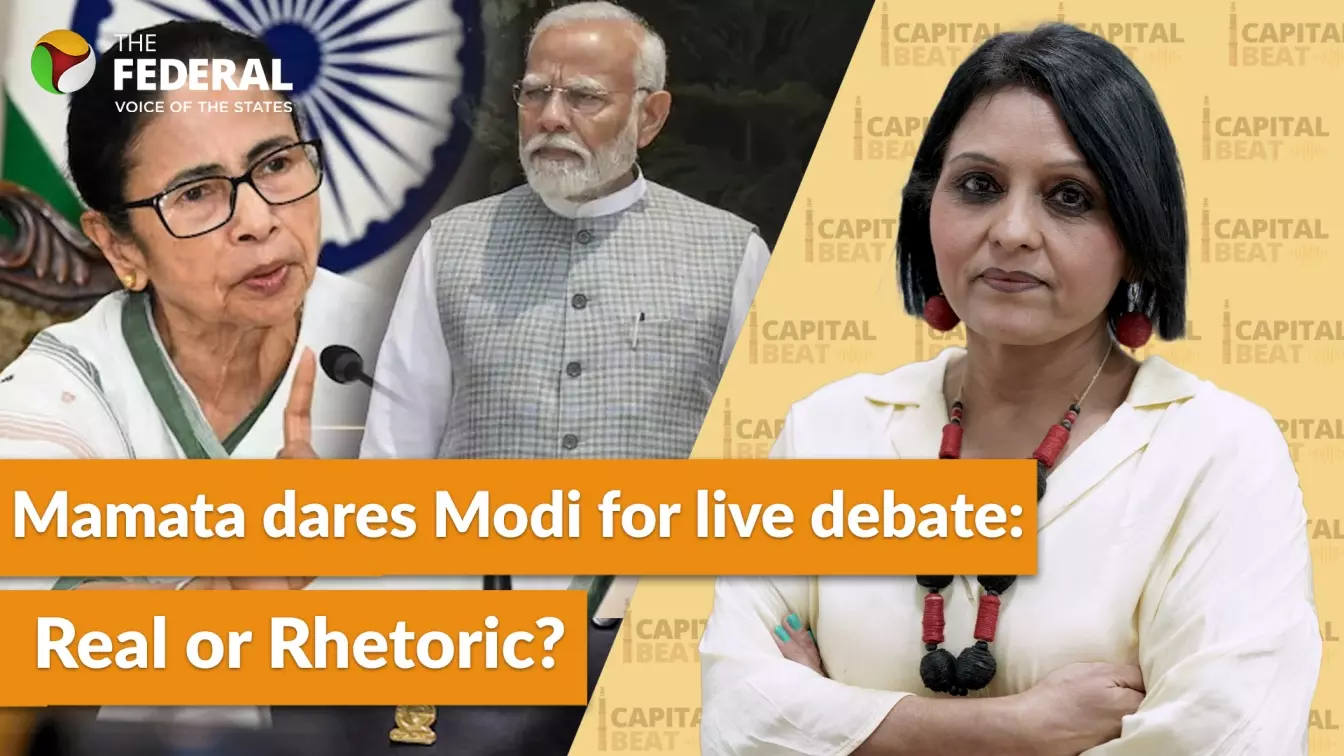
Operation Bengal backlash
Discussion: Why Mamata has challenged PM Modi for a live TV debate
Mamata Banerjee hits back at PM Modi’s “Operation Bengal” jibe, dares him for a live debate and early elections. Will this bold move reshape Bengal politics?

In this episode of Capital Beat, West Bengal Chief Minister Mamata Banerjee’s sharp rebuttal to Prime Minister Narendra Modi’s “Operation Bengal” remark took centre stage. Trinamool Congress (TMC) spokesperson Shubhankar Bhattacharya and senior journalist Samir K Purkayastha joined the discussion, dissecting Mamata’s challenge for a live debate and early elections, raising critical questions on political narratives, nationalism, and ground realities in West Bengal.
'Operation Bengal' backlash
Mamata’s fiery response came after PM Modi's assertion that “Operation Bengal” was in motion, implying political and administrative action against TMC. Mamata termed the remark “an insult to the people of Bengal”, adding that Modi had “disrespected the women of Bengal”. She declared, “Bring your teleprompter… call elections tomorrow — we are ready!”
Also read: As BJP threatens Pak-style action in Bengal, Mamata takes a ‘sindoor’ jibe at PM
Bhattacharya emphasised that such language equated Bengal with adversarial states, stating, “Are you considering Bengal the same as Pakistan?” He called Modi’s terminology a deliberate attempt to trigger nationalist sentiment before elections.
Purkayastha explained that Mamata’s aggressive posture was no coincidence. “She’s at her best when attacking,” he said, suggesting that the BJP’s rhetoric had given TMC a window to reclaim momentum.
Narrative control and momentum
The BJP’s reference to “Operation Bengal” was seen by both guests as a deliberate strategy to reset the electoral narrative. According to Bhattacharya, Modi was “testing branding value” for both Bihar and Bengal elections through the Operation Sindoor. However, he cautioned that politicising military success could backfire. “The Indian Army did its duty irrespective of the name,” he noted.
Also read: PM Modi is politicising 'Operation Sindoor': Mamata Banerjee
Purkayastha added that the BJP has historically relied on emotive issues like nationalism and communal polarisation to unite its base. However, he pointed out, “This time, the public response to Operation Sindoor hasn't matched the Pulwama moment.”
Subnationalism vs nationalism
A key theme of the discussion was the clash between Modi’s nationalism and Mamata’s Bengali subnationalism. Purkayastha argued that the BJP’s nationalistic overtures help the TMC evoke regional pride. “Every time BJP pushes nationalism, Mamata responds with Bengali identity,” he said.
Also read: Why BJP does not want Bengal polls to be clubbed with other states
He also warned that over-politicising national security undermines its seriousness. Referring to BJP workers applying sindoor on policewomen, he remarked, “They are trivialising a serious operation by turning it into political theatre.”
Bhattacharya agreed, calling it “pseudo-nationalism” and asserting that Operation Sindoor is now being used “as a trump card where there is no real development plank.”
Ground realities in Bengal
The discussion also focused on TMC’s grassroots connect. Bhattacharya cited Mamata’s personal involvement during disasters like Cyclone Amphan as proof of her emotional resonance with voters. “She may not be a great orator, but she’s present where it matters,” he said.
While acknowledging the BJP’s use of nationalism as a powerful tool, both panelists noted TMC’s agility in narrative adaptation. Purkayastha pointed to how TMC quickly repositioned Operation Sindoor as an affront to Bengal’s dignity, tapping into Bengali sentiment.
Bhattacharya concluded that the BJP’s rhetoric would likely dominate discourse for the next year, but added a warning: “Mamata will have to craft a new counter-narrative — this one won’t be enough.”
While Operation Sindoor might have reignited the BJP’s political momentum, Mamata’s bold challenge has stirred a potent narrative of her own. As Bengal gears up for potential early polls, the clash between nationalism and subnationalism seems inevitable, but who will shape the final story remains to be seen.
(The content above has been generated using a fine-tuned AI model. To ensure accuracy, quality, and editorial integrity, we employ a Human-In-The-Loop (HITL) process. While AI assists in creating the initial draft, our experienced editorial team carefully reviews, edits, and refines the content before publication. At The Federal, we combine the efficiency of AI with the expertise of human editors to deliver reliable and insightful journalism.)

